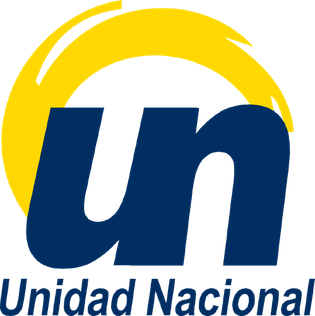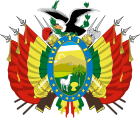
The politics of Bolivia takes place in a framework of a presidential representative democratic republic, whereby the president is head of state, head of government and head of a diverse multi-party system. Executive power is exercised by the government. Legislative power is vested in both the government and the two chambers of parliament. Both the Judiciary and the electoral branch are independent of the executive and the legislature. After the 2014 Bolivian general election, 53.1% of the seats in national parliament were held by women, a higher proportion of women than that of the population.

The Plurinational Legislative Assembly is the national legislature of Bolivia, placed in La Paz, the country's seat of government.
The Fearless Movement is a defunct progressive political party in Bolivia. MSM was founded on March 1, 1999 and dissolved following the 2014 Bolivian general election.

Movement for Socialism – Political Instrument for the Sovereignty of the Peoples, is a socialist political party in Bolivia. Its followers are known as Masistas. In the December 2005 election, MAS-IPSP won the first ever majority victory by a single Bolivian party. The party continued to rule until 10 November 2019, and was victorious again in the 2020 elections.

The National Unity Front is a political party in Bolivia. It was founded in late 2003 by Samuel Jorge Doria Medina Auza, who had broken with the Revolutionary Left Movement earlier that year. It has 36 members of the Chamber of Deputies in the Plurinational Legislative Assembly. Despite its substantial share of the urban vote, and 16 former mayors, it does not control any city halls or governorships. The party is closely identified with Doria Medina's cement company Sociedad Boliviana de Cemento (Soboce).

Municipalities in Bolivia are administrative divisions of the entire national territory governed by local elections. Municipalities are the third level of administrative divisions, below departments and provinces. Some of the provinces consist of only one municipality. In these cases the municipalities are identical to the provinces they belong to. There are 340 municipalities.

The Media Luna or Media Luna Ampliada refers to a group of four departments – Santa Cruz, Beni, Pando, and Tarija – in Bolivia which are home to a greater proportion of opponents to the national government led by Evo Morales and the Movement for Socialism (MAS) than the rest of the country. Pando has seen increasing support for MAS since 2009, while Tarija was initially supportive but has opposed MAS in every election after 2014. In contrast to the predominantly Indigenous Andean populations of the Andean region such as La Paz and Cochabamba, the departments in the Media Luna are majority mestizo, as well as being made up of the remaining 26 groups of lowland indigenes with white minorities, specifically in Santa Cruz de la Sierra.

The following outline is provided as an overview of and topical guide to Bolivia:

General elections were held in Bolivia on December 6, 2009, following a constitutional referendum held on 25 January 2009. The election was initially expected to be held in 2010. Voters elected:
The tournament started in 1960, initially only champions from La Paz, Cochabamba, Oruro and Santa Cruz participated, in later years teams from other associations started joining the cup, and the tournament eventually also had runner-up's participating.
The Bolivian football league system is a series of interconnected leagues for association football clubs in Bolivia.

Municipal elections were held in Bolivia, on December 5, 1999, in all 311 municipalities across the country. The elections marked a milestone in the continuous deterioration of the political influence of the traditional parties. In 23 municipalities the mayors were elected through direct popular vote, in other municipalities the mayors were elected by the respective municipal council.
The first Bolivian judicial election was held on 16 October 2011. The national vote was held to elect magistrates to serve on the Supreme Court of Justice, the Plurinational Constitutional Court, the Agro-environmental Court and members of the Judiciary Council. It was originally scheduled to be held on 5 December 2010, but officials of the National Electoral Court and of the MAS majority in the Plurinational Legislative Assembly delayed it. The vote will be the first time that a Latin American country directly elects its highest judicial officials.
The United Left was a political coalition in Bolivia, launched ahead of the 1985 general election. IU was founded on February 22, 1985, by Isaac Sandoval Rodríguez, Federico Hurtado, and Pedro Monteciño. The United Left was composed of Eje de Convergencia, Revolutionary Workers Party Trotskyist-Posadist, and other leftwing groups.

Parliamentary elections were held in Bolivia in December 1920 to elect a new National Congress. They followed the coup d'état that prevented the Congress elected in May 1920 from taking office.

The Plurinational Electoral Organ is the independent electoral branch of the government of Bolivia. It replaced the National Electoral Court in 2010.
The Supreme Court of Justice is the highest court of ordinary jurisdiction in Bolivia, based in Sucre. Its powers are set out in Articles 181–185 of the 2009 Constitution and the Law of the Judicial Organ. It was first seated on 2 January 2012.

The 2010–2015 Plurinational Legislative Assembly of Bolivia was the first class of the Bolivian legislature, also known as the Plurinational Legislative Assembly, to go by that name. The Assembly was controlled in both houses by the governing Movement for Socialism (MAS-IPSP), elected with a 2/3 supermajority, although some members later separated themselves from the majority. Just four incumbent members of the 2005–2010 Congress returned: Deputy Antonio Franco; Deputy Javier Zabaleta (MAS-IPSP/MSM); Senator René Martínez (MAS-IPSP), who was a deputy; and Senator Róger Pinto, previously of Podemos and now representing PPB-CN.
Damián Condori Herrera is a Bolivian peasant leader, politician, and Governor of Chuquisaca Department since 3 May 2021. Condori served as executive secretary of the Unified Syndical Confederation of Rural Workers of Bolivia (CSUTCB), Bolivia's largest peasant union. Condori first ran for governor of Chuquisaca in 2015, finishing second and failing to qualify for a runoff under a controversial electoral court ruling. He is the co-founder of We Are All Bolivia, a party founded on 21 April 2016, by dissident former members of the Movement for Socialism–Political Instrument for the Sovereignty of the Peoples (MAS-IPSP). He was spent two years in pre-trial detention as part of the investigation into the Indigenous Fund corruption scandal from 2015 to 2017. In the 2021 election for governor, Condori won a plurality in the first round and defeated MAS-IPSP candidate Juan Carlos León in the runoff.

The 2021 Bolivian regional elections were held on 7 March 2021. Departmental and municipal authorities were elected by an electorate of approximately 7 million people. This was the third regional election under the 2009 constitution. It was postponed from the expected date of 2020 due to the 2019 Bolivian political crisis and delays in holding the 2020 Bolivian general election. All elected authorities assumed office on 3 May.










